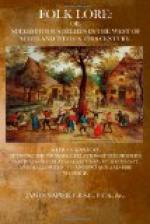As the funerals fifty years ago were mostly walking funerals, the coffin being carried between two spokes, the sort of weather during the funeral had its omens, for in these days the weather was believed to be greatly under the control of the devil, or rather it was considered that he was permitted to tamper with the weather. If the day was fine, this was naturally a good omen for the soul’s welfare. I remember that the funeral of the only daughter of a worthy couple happened on a wet day, but just as the funeral was leaving the house the sun broke through and the day cleared, whereupon the mother, with evident delight, as she stood at the door, thanked God that Mary was getting a good blink. Stormy weather was a bad omen, being regarded as due to Satan’s influence. Burns refers to this belief in his “Tam o’ Shanter.” When referring to the storm, he says:—
“Even a bairn might understand
The deil had business on his
hand.”
The following old rhyme mentions the most propitious sort of weather for the christening, marriage, and funeral:—
“West wind to the bairn when
gaun for its name,
Gentle rain to the corpse
carried to its lang hame,
A bonny blue sky to welcome
the bride,
As she gangs to the kirk,
wi’ the sun on her side.”
The wake in the Highlands during last century was a very common affair. Captain Burt, in his letters from Scotland, 1723, says that when a person dies the neighbours gather in the evening in the house where the dead lies, with bagpipe, and spend the evening in dancing—the nearest relative to the corpse leading off the dance. Whisky and other refreshments are provided, and this is continued every night until the funeral.
Pennant, in his tour through the Highlands, 1772, says that, at a death, the friends of the deceased meet with bagpipe or fiddle, when the nearest of kin leads off a melancholy ball, dancing and wailing at the same time, which continue till daybreak, and is continued nightly till the interment. This custom is to frighten off or protect the corpse from the attack of wild beasts, and evil spirits from carrying it away.




